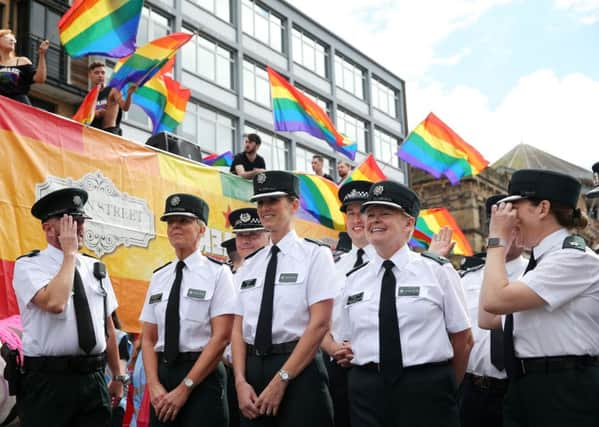Gay Pride: which other parades can PSNI walk in?


Yesterday Chief Constable George Hamilton accepted an invitation by Garda Commissioner Drew Harris to allow uniformed PSNI officers to take part in the Dublin Pride gathering tomorrow.
Uniformed PSNI officers have taken part in Belfast Pride for several years now.
Advertisement
Hide AdAdvertisement
Hide AdPSNI Deputy Chief Constable Stephen Martin said: “Pride is an important series of events for those who identify as being LGBTQ [lesbian, gay, bisexual, transgender, and queer/questioning] and we see this as an opportunity to continue to support, and build upon our relationship with, the LGBTQ community and our colleagues in An Garda Síochána.”
However, Peter Lynas, NI director of the Evangelical Alliance, asked: “Will uniformed officers march on the 12th July or at Easter Rising commemorations? Or what about the next Brexit or remain march?”
TUV leader Jim Allister said it is incumbent on the PSNI to be politically neutral, yet Pride is “an expressly political event” which demands changes in NI marriage laws.
SDLP MLA Dolores Kelly, howeve,r said it will “send a clear message of hope and acceptance to young LGBT+ officers and the LGBT+ community”.
Advertisement
Hide AdAdvertisement
Hide AdAsked by the News Letter if officers can now take part in uniform in other parades, such as ones on July 12, the PSNI said: “Any invitation to participate in any public event will receive due consideration. The PSNI engage with a range of minority, community and public groups and the opportunities available to PSNI to do so are wide and varied.
“In respect of the Orange Order, which has a very visible and organised structure, the PSNI has regular contact at a local and strategic level.
“This proactive engagement with the Orange Order is very welcome, and essential, and the PSNI has been represented at a previous event organised by the Orange Order. However, contact with those who identify as LGBT, and associated groups, is more sporadic and therefore the opportunity to use Pride events as a means to engage in this way is considered important.”
The PSNI also said: “All PSNI participants in the [Dublin pride] parade are doing so in their own time, they are not being paid and are not being abstracted from operational duties to do so.”
Advertisement
Hide AdAdvertisement
Hide AdAs to why the PSNI’s relationship with the gay community would be different from any other, the PSNI said: “Minority groups are normally under-represented in the Police Service and can be the subject of hate crime.
“Engagement is an important opportunity to address under-representativeness, increase confidence amongst those communities and promote the importance of reporting hate crime.”